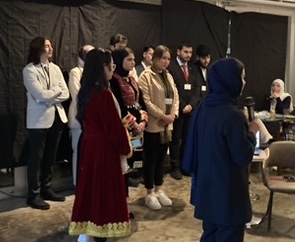August 15, 2024, marks three years since the fall of Kabul and the Taliban’s takeover of Afghanistan. According to the “Global Trends Report 2023” by UNHCR, Afghanistan now ranks as the top country of origin for refugees, with 6.4 million people displaced. Those remaining in Afghanistan face severe restrictions under Taliban rule, particularly women, who are denied access to higher education and employment, and young people who are deprived from their future. The international community continues to express deep concern over the human rights violations occurring in the country. Although Afghanistan is not frequently covered in the Japanese media, we hope that this three-year anniversary will prompt greater awareness of the situation of Afghan women and youth.
Since August 2021, more than 850 people with ties to Japan—including embassy staff, JICA employees, ODA-related corporate workers, NGO staff, and former students who studied in Japan—have fled Afghanistan to Japan. In 2022-2023, a total of 384 Afghans were granted refugee status, and as of December 2023, an additional 312 afghans have been granted permession to stay in Japan under “Designated Activities” visas. However, there is currently no public support specifically for Afghan evacuees. Even those granted refugee status often find it difficult to achieve economic independence through the standard six-month Japanese language education and self-reliance support programs. As a member organization of the Afghanistan Evacuation Assistance Consortium, Actions for Afghans (AFA), Pathways Japan has been actively involved in formulating recommendations to enhance the support framework, particularly in areas such as Japanese language education for refugees and evacuees.
* For more details on AFA’s activities, click here.
In response to these challenges, Pathways Japan has been accepting young Afghans living outside their home country since 2022. Over the past three years, 14 individuals have been welcomed into Japan. Between March and June this year, the first cohort of three students completed their two-year Japanese language school program, successfully securing employment and achieving independence. The opportunity for business-level Japanese language education has allowed them to build new careers in Japan.
The demand for safe passage to Japan remains high, as evidenced by the 700 applications received for the six available slots in the 2023 “Japanese Language School Pathways” program. Among these applicants, 214 were women who were denied education and employment opportunities in their home country. For the 2025 academic year, we plan to expand the intake to eight students and are currently in the process of recruitment.
Additionally, under the “Toshizo Watanabe International Scholarship,” which supports higher education for young refugees in Japan, four of the 12 scholarship recipients for 2024 are from Afghanistan. Among them is a female university senior who, unable to return to her homeland. They are pursuing her studies at a Japanese university with the hope of contributing to Afghanistan’s future recovery.
Pathways Japan also offers online Japanese language courses for Afghanistan evacuees, students who are unable to return home, and their families. This initiative supports those who have not yet mastered the language, helping them acquire the skills needed for independent living in Japan. So far, 20 participants have completed the course and acquired basic Japanese language proficiency, enabling them to take the first steps toward self-reliance, including securing part-time employment.
Voices from Afghan Students:
・Message from Hameed, who graduated in 2024
・From the video: Interview with Sam from Afghanistan
・Speeches by students from three countries, welcomed to Japan in 2024



Despite the ongoing humanitarian crises in Ukraine and Gaza that have drawn international attention away from Afghanistan, the human rights situation within Afghanistan and the challenges faced by Afghan evacuees in Japan remain critical. Pathways Japan is committed to continuing its support for the Afghan people, helping those who have fled conflict and political turmoil to find a path to self-reliance in Japanese society.
